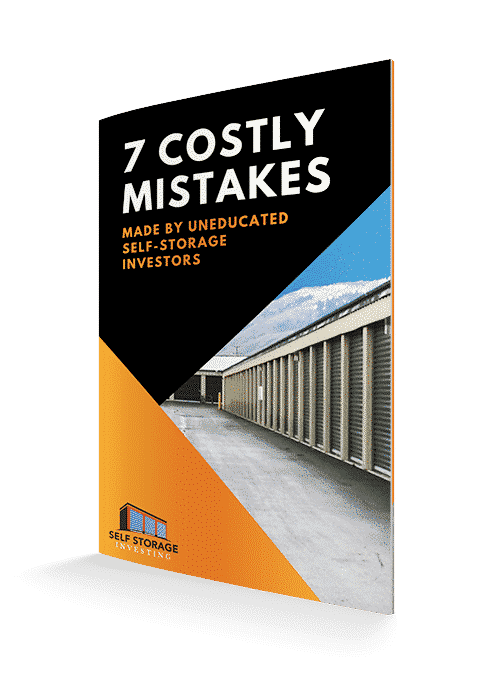Do you want to make money from real estate? Then, you need to find some income-producing real estate ASAP. In this quick guide, we’ll provide you with the tools and knowledge necessary for seeking out those properties and making successful investments. We’ll show you how to recognize lucrative deals and briefly cover the basics about the best income-producing real estate: self-storage facilities.
Real Estate Can Make You Rich!
Let’s clear the waters first – yes, real estate can make you rich. In fact, investing in real estate is the most effective wealth-building strategy. It isn’t even a secret! Wealthy people are holding multiple investments, ranging from stocks to properties, with the latter being safer and more profitable. Naturally, you need to know what you’re doing. You can’t just pick up random properties and expect miracles!
Finding lucrative deals, both in the residential and commercial real estate worlds, can be tough. Luckily, there are so many experts out there ready to share their knowledge and experience with the rest of us. Make it a rule to always consult with professionals before you invest, whether in stocks, real estate, bonds, cryptos – you name it.
You can never be informed enough, especially when you’re creating unique strategies to make money. And trust us when we say that these strategies are unique. We all have different starting positions, different jobs, and financial options, so you need to tailor your investments to your needs. You can’t invest in large commercial deals without a certain amount of capital. Hence, you are limited to finding the most profitable options for your current position. For example, you can get in on some self-storage investments with very little cash and start your journey to wealth!
Seek out opportunities around you, or find a person that can. This is the first step toward becoming rich. The second one is getting consistent cash flow from those deals and reinvesting. You can build a quality investment portfolio from scratch, but everything starts with smart decisions. Conduct quality research on the real estate market, find investment capital by proper budgeting, and always think for the long term.
Nobody got rich overnight, and people who have (e.g., lottery winners) generally lost it all because they didn’t look far down into the future. Make sure to create a rational pathway to the future so you know when to back out of certain investments and when to go all in. Setting clear goals will keep you steady on the path toward a brighter financial future.

Earning Income from Real Estate
After you’ve determined your long-term goals, let’s see how you can achieve them. As said, we’ll be discussing income-producing properties because we know the real estate industry has enormous potential.
There are two types of income generation from real estate, one gained by active involvement from the investor and one that is generated passively. If your current job doesn’t allow you to put a lot of time and energy into outside deals, you always have the option to be a passive investor. There are lots of real estate investors that are “silent partners.” They provide capital for a manager (or a company) that will scout out lucrative deals and manage the investment. Whether making investments through syndication, in which you pool the money with other silent partners, or putting money in an REIT (a trust that functions like an investment fund), your income will be passive. You don’t have to be actively involved in property management, legalities, dealing with tenants, etc.
Speaking of tenants, we should note that there are two ways of earning income from real estate: through property appreciation and through renting. Appreciation is an increase in a property’s value over time. You could buy, for example, a house for $20,000, and in ten years when it’s worth $250,000, you might sell it and earn a profit of 50k. You can manually increase the value of a property by making improvements such as creating additional space or adding desired amenities.
The second way to earn an income is by leasing. Rental properties provide monthly income from tenants. This is where vacancy rates matter a lot: If you don’t have a tenant and your property sits empty, you won’t be receiving any income while the operating expenses and taxes just keep piling up. Hence, we can say that lucrative real estate assets are those with low vacancy rates and high appreciation rates.
Our main sector of real estate investment, self-storage, fulfills both criteria. Due to the high demand for personal storage space in periods of both economic growth and decline, we don’t have to worry about vacancies, while the value of our facilities keeps increasing over time. Everything, naturally, depends on the location (because, in the real estate world, location is everything), but in most cases, you can’t make a mistake with self-storage.
Think about the basic rules of supply and demand. There aren’t enough self-storage facilities, so there’s room for growth. In fact, this industry is booming right now. From construction and development to running self-storage facilities as a business, people are racing to get in. Why? Because of the demand built on global urbanization, downsizing (both personal and business), lifestyle changes, and other factors. People need storage units, especially in times of crisis. The self-storage sector can withstand a recession and economic downturns.
Take the recent COVID-19 crisis as an example. As businesses closed and people shifted to working from home, office spaces became redundant. Likewise, people began downsizing to smaller (cheaper) apartments or moving in with their families to save on expenses. Yet, office equipment, as well as people’s personal belongings (like vehicles, sports equipment, and other bulky items), still need storing. Enter self-storage units, which are affordable and easily leased.
When you invest in a residential rental property, your income depends on your ability to find tenants. Naturally, if you don’t want to be a landlord, you can hire a management company to take care of leasing the property (which costs money). On the other hand, in the self-storage business, you don’t have to worry about anything! You can always find tenants. In fact, tenants find you!
Almost anything is automated, with smartphones and rental kiosks becoming the main management tools. Nowadays, people can rent, access, and pay for their units with a click of a button, and the owners don’t have to do a thing! On top of everything, technology provides safety. You can rest assured your facilities will be secure so you don’t have to worry about break-ins. All of this drew us into self-storage investing, and we never looked back.
A Beginner’s Guide to Income-Producing Real Estate
Let’s add to the information above and give you some of the most common ways that people enter real estate investing. As said, you can be an active or a passive investor, depending on the amount of time you have on your hands, and there are lots of real estate properties you can choose from.

Rental Properties
Rentals can provide you with a consistent and steady cash flow every month. Naturally, you can always sell your property for a profit, but the main purpose of rentals is generating monthly income. You can invest in long-term residential rentals, in which you leverage a buy-and-hold strategy. People always need a place to live, so if you find a decent location near job sites and schools, single-family homes or apartments can be quite lucrative.
There’s also the option to invest in short-term rentals, such as vacation homes. While these assets can be more profitable, they require more involvement on your side. Tourists come and go, so you either need to hire a manager or deal with constant requests by yourself. While vacation rentals are pretty lucrative, this investment can get tiring, especially if you invest in a highly-trafficked tourist location.
Note that when you’re making your new investment decision, you should always consider whether your monthly income from rentals can cover your expenses (mortgage, taxes, etc.) and whether the property will increase in value. If not (maybe the interest rates on the mortgage are higher, and your rental income can’t cover the expenses), you should pass on this investment opportunity and find new ways to invest in real estate. It’s like every other business out there: You don’t want to operate with a loss. You want to earn money without much trouble, and the key to doing this is finding the best income-producing property. If you fail at that, everything else will also crumble.
Fix-and-Flip
As mentioned, you can make money through property appreciation. Essentially, this strategy involves buying a property (preferably for a low price), renovating it, and selling it for a profit. Going through this process might seem tricky, especially for inexperienced investors. Everything revolves around finding properties with huge potential. Distressed properties with a stellar location (that can be renovated for very little money) can be quite lucrative, but you need to find them. Don’t hesitate to get insights from experienced realtors and flippers that are willing to share their tips.

Syndication
Since investing in real estate requires quite a bit of cash, especially in the commercial sector, many investors pool their money together. Property syndication is essentially a partnership between passive investors and a syndicator (also known as the sponsor). The syndicator is responsible for finding the deal, raising capital, and managing the property, while the silent partners provide the capital and get their monthly checks. Sounds pretty easy, right? The key here is finding a trustworthy and capable sponsor that can get a hold of a valuable income property. Not all assets are created equal!
Real Estate Investment Trust
REITs function like investment funds. You’ll be putting money in trusts that invest or provide funding for real estate investments and then receive money, depending on the rate for the REIT in question. It’s a simple process, and you can expect high dividends plus income from appreciation once the property is sold. Returns for REITs were around 15% in June 2020, which is higher when compared to the return of the S&P 500 Index, which was 10%. However, this doesn’t mean that REITs are necessarily superior. They are just performing better at the current moment.
Self-Storage Investing
Yes, we’re going to mention self-storage again. We are a community of self-storage investors, but this isn’t the only reason we recommend investing in this industry. We believe that self-storage provides great returns for investors while allowing them to be a part of a great diversification strategy. You want to invest across multiple asset classes in order to reduce risks and avoid losses during economic downturns. And what’s a better way to do this than putting your money in a recession-resistant investment like self-storage?

Conclusion
We hope that this small guide gave you a decent idea about real estate investing. If you want to invest in real estate but don’t know where to start, don’t worry. Our community is here, and we are very accepting of newcomers. Our experts will happily show you the basics so you can make informed decisions and start your investment journey. Let’s learn together!






